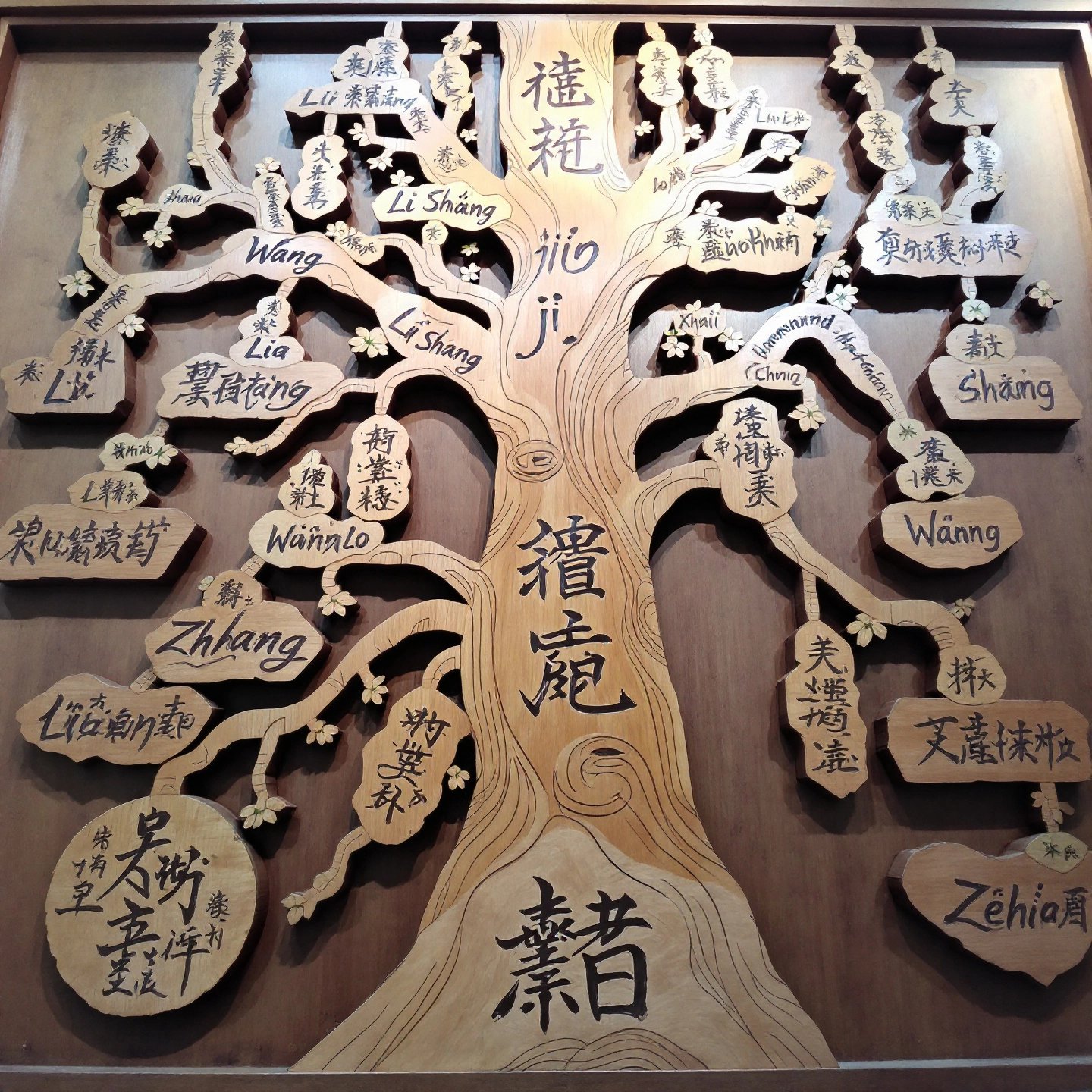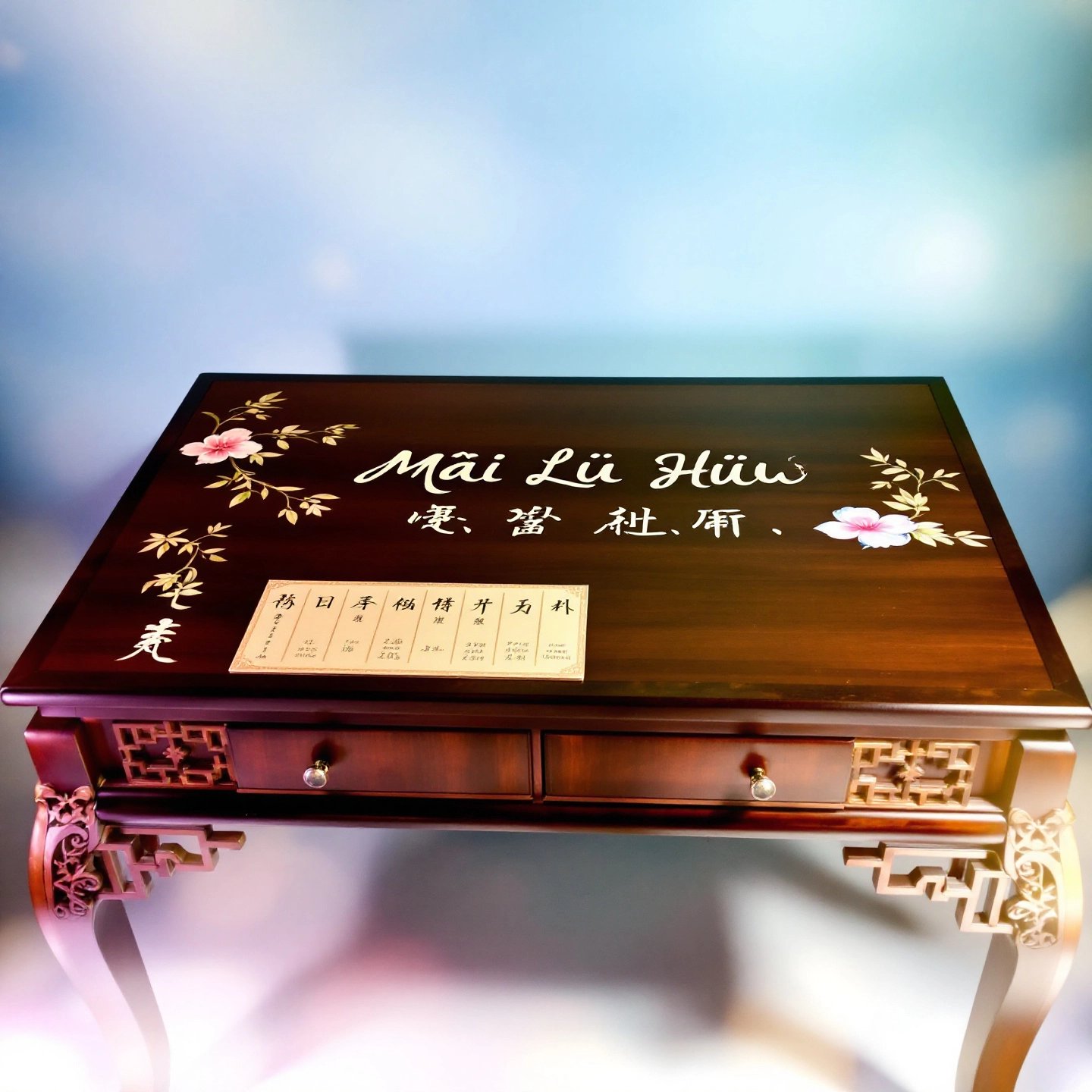Introduction to Beautiful Chinese Female Names
Chinese female names are much more than mere identifiers; they are rich tapestries woven with cultural significance and beauty. These names often reflect virtues, elements of nature, and parental aspirations, offering a profound insight into Chinese heritage and values. In Chinese culture, names are seen as lifelong blessings, with parents meticulously choosing names that embody their hopes and dreams for their children.
Imagine a name that not only sounds melodious but also carries the essence of grace, wisdom, and prosperity. This is the allure of beautiful Chinese female names. For instance, a name like 'Mei' (美) signifies beauty, while 'Ling' (灵) conveys intelligence and spirit. Such names are not just labels; they are symbols of the qualities that parents wish to instill in their daughters.
Chinese names often draw inspiration from nature and virtues, encapsulating elements like flowers, seasons, and celestial bodies. For example, 'Hua' (花) means flower, and 'Yue' (月) signifies the moon, each name painting a vivid picture of the natural world. Additionally, virtues such as 'Ai' (爱) for love and 'Xiu' (秀) for elegance are common themes, reflecting the deep-rooted values of Chinese society.
Beyond their aesthetic appeal, these names also serve as cultural bridges, connecting individuals to their ancestral roots and the rich tapestry of Chinese history. As you explore the world of beautiful Chinese female names, you'll discover a blend of tradition and modernity, where each name tells a story of its own. Whether you are choosing a name for a child or simply appreciating their beauty, these names offer a window into the heart of Chinese culture and its timeless wisdom.

Structure and Significance of Chinese Female Names
Understanding the structure of Chinese names is essential to appreciating their cultural richness and significance. Unlike Western naming conventions, Chinese names begin with the family name, followed by the given name. This order underscores the importance of family and heritage in Chinese culture. The family name, typically one syllable, is shared across generations, serving as a link to one's ancestry. Some of the most common family names include Li (李), Wang (王), and Zhang (张), which together are borne by millions of people in China. (source)
The given name, often consisting of one or two characters, is where parents express their aspirations and hopes for their child. These names are not chosen lightly; they are imbued with meanings that reflect virtues, beauty, and positive attributes. For instance, the name 'Mei' (美) translates to 'beautiful,' and is a popular choice for its aesthetic and symbolic appeal. Another example is 'Ling' (灵), which conveys intelligence and spirituality, qualities that parents wish to see in their daughters. (source)
Chinese names are also unique in that they can reflect the era or significant events during which a person was born. For example, names like Jianguo, meaning 'establish the country,' became popular in the 1950s, commemorating the establishment of the People’s Republic of China. This practice highlights how names can serve as historical markers, connecting individuals to broader cultural narratives.
When choosing a given name, parents often consider phonetic harmony and the auspiciousness of the characters. The name should not only sound pleasing but also align with the family's values and the child's destiny. This careful selection process underscores the belief that a name can influence one's fortune and life path.
In summary, the structure of Chinese female names is a reflection of cultural priorities and family values. They are more than just identifiers; they are meaningful expressions of identity, heritage, and hope. As we delve deeper into the themes and trends of these names, you'll see how they continue to evolve, blending tradition with modern influences.
Popular Themes in Chinese Female Names
Chinese female names are imbued with themes that resonate deeply with cultural values and aesthetics, often drawing inspiration from nature, virtues, and precious items. These themes not only highlight the beauty of the names but also reflect the aspirations and values that parents wish to bestow upon their daughters.
Nature-Inspired Names
Nature is a predominant theme in Chinese names, symbolizing beauty, tranquility, and harmony. Names like 'Hua' (花), meaning flower, and 'Yue' (月), signifying the moon, capture the essence of the natural world. These names often evoke imagery of serene landscapes and celestial bodies, imparting a sense of peace and elegance. Another example is 'Lian' (莲), which means lotus, a flower revered for its purity and grace. Such names are not only aesthetically pleasing but also carry symbolic meanings, often associated with growth and renewal.
Virtue-Based Names
Virtues are another significant theme in Chinese female names, reflecting the moral values and qualities that are highly esteemed in Chinese culture. Names like 'Ai' (爱) for love and 'Xiu' (秀) for elegance are chosen to inspire these virtues in the bearer. These names serve as a constant reminder of the qualities that parents hope their daughters will embody. 'Fang' (芳), meaning fragrance, is another popular choice, symbolizing beauty and virtue. Such names are deeply rooted in the cultural belief that a person's name can influence their character and destiny.
Precious Items as Names
In addition to nature and virtues, Chinese names often incorporate elements that denote preciousness and value. Names like 'Bao' (宝), meaning treasure, and 'Yu' (玉), signifying jade, are examples of how parents express their love and hopes for a prosperous future for their daughters. These names are not only beautiful but also convey a sense of worth and cherished identity. The use of precious items in names underscores the importance of the individual within the family and society.
In essence, the themes of nature, virtues, and precious items in Chinese female names reflect a rich tapestry of cultural values and aspirations. These names are more than mere identifiers; they are profound expressions of beauty and meaning, offering a glimpse into the cultural heritage and the hopes that parents have for their daughters. As we explore further, we'll see how these themes continue to evolve, blending tradition with contemporary influences.

Top Beautiful Chinese Female Names and Their Meanings
Chinese female names are a beautiful blend of sound, meaning, and cultural significance. They often encapsulate the hopes and dreams of parents for their daughters, with each name carrying its own unique charm and symbolism. To provide a clearer understanding, let's explore some popular Chinese female names along with their meanings, organized in a table for easy reference.
| Name | Meaning | Pronunciation |
|---|---|---|
| Ai (爱) | Love, affection | AH-ee |
| Xiu (秀) | Elegance, grace | SHYO |
| Mei (美) | Beauty, beautiful | MAY |
| Hua (花) | Flower | KHWAH |
| Fang (芳) | Fragrance, virtuous | FAHNG |
| Li (丽) | Pretty | LEE |
| Jing (静) | Peace, quiet | CHEENG |
| Ying (英) | Flower, wise | EENG |
| Min (敏) | Clever | MEEN |
| Yu (玉) | Jade | YOO |
These names reflect the rich tapestry of Chinese culture, where each character is chosen for its auspicious meaning and phonetic harmony. For instance, 'Ai' (爱) is a common choice for its association with love and affection, while 'Xiu' (秀) is favored for its connotations of elegance and grace. Similarly, 'Mei' (美) is popular for its representation of beauty, making it a timeless choice for many families.
Names like 'Hua' (花) and 'Fang' (芳) draw inspiration from nature, embodying the beauty and serenity of flowers. 'Jing' (静), meaning peace and quiet, is a name that parents might choose if they wish for a tranquil future for their daughter. 'Ying' (英) is another versatile name, reflecting both wisdom and the delicate beauty of flowers.
In essence, these popular Chinese female names are more than just labels; they are imbued with cultural significance and personal aspirations. As you consider these names, you'll notice how they encapsulate the values and hopes that are cherished in Chinese society. Whether you are selecting a name for a child or simply exploring the beauty of these names, each one offers a glimpse into the rich cultural heritage of China.
Trends in Modern Chinese Female Names
In recent years, the landscape of Chinese female names has undergone a fascinating transformation, reflecting a blend of traditional values and contemporary influences. Modern Chinese parents are increasingly choosing names that not only honor cultural heritage but also resonate with global trends and modern sensibilities. This evolution is evident in the rising popularity of names that sound similar to Western names or possess positive connotations in both Eastern and Western cultures.
Blending Tradition with Modernity
One of the most notable trends is the integration of Western-sounding names into the traditional Chinese naming system. Names like 'Anna' (安娜) and 'Lina' (丽娜) are gaining traction, as they offer a phonetic similarity to familiar Western names while maintaining their Chinese character roots. This trend reflects a broader cultural openness and a desire to embrace global influences while retaining a connection to Chinese identity. Such names are particularly popular among urban families and those with international aspirations, as they symbolize a harmonious blend of East and West.
Positive Connotations Across Cultures
Another trend is the selection of names that carry universally positive meanings, appealing across cultural boundaries. Names like 'Yutong' (雨桐), which combines the elements of rain and the phoenix tree, are chosen for their poetic beauty and auspicious meanings. Similarly, names such as 'Bingbing' (冰冰) and 'Mengmeng' (萌萌) are favored for their charming and endearing qualities, reflecting the parents' hopes for a bright and joyful future for their daughters.
This modern approach to naming is not merely about adopting Western styles but rather about creating a meaningful fusion that respects tradition while embracing modernity. It underscores the evolving nature of Chinese society, where cultural heritage and contemporary influences coexist and enrich each other.
As we continue to explore the world of beautiful Chinese female names, it's clear that these modern trends reflect a dynamic interplay between past and present. They offer a window into the aspirations of today's Chinese families, who seek to honor their roots while navigating a rapidly changing world. This blend of tradition and innovation ensures that Chinese names remain as vibrant and meaningful as ever, resonating with beauty and cultural significance.

Choosing the Perfect Chinese Name
Selecting the ideal Chinese name involves more than just a translation of your native name; it is a thoughtful process that considers meaning, phonetics, and cultural significance. When you embark on this journey, you'll find that each character in a Chinese name carries profound symbolism, often chosen to reflect personal virtues, aspirations, or connections to nature.
Understanding the Significance
Imagine choosing a name that speaks to your personality or the values you hold dear. In Chinese culture, names are not merely labels but reflections of one's identity and familial hopes. For instance, a name like 'Xiu' (秀) implies elegance, while 'Zhen' (珍) denotes something precious. Understanding these nuances is crucial in selecting a name that resonates with your identity.
Phonetics and Harmony
Sounds complex? When choosing a Chinese name, phonetic harmony is essential. The name should not only sound pleasant but also align with the cultural aesthetic. Avoid names that are difficult to pronounce or have unintended meanings in Chinese. Consulting with native speakers or using a Chinese Name Generator can ensure that your chosen name is both beautiful and appropriate.
Utilizing Tools and Resources
For those exploring Chinese names, tools like the CNG's Chinese Name Generator offer invaluable assistance. This AI-powered tool provides culturally authentic names, blending tradition with modernity. It allows users to explore names based on style preferences, ensuring that each choice is meaningful and unique. Whether you're looking to adopt a name for personal or professional reasons, such tools simplify the process by providing options that are both elegant and culturally significant.
Choosing a Chinese name is a journey into the heart of a rich cultural tradition. By considering meaning, phonetic harmony, and cultural relevance, you can find a name that not only fits your identity but also connects you to the timeless beauty of Chinese heritage. As you continue this exploration, remember that the perfect name is one that resonates with both you and the cultural tapestry it represents.
Examples of Chinese Nicknames
In Chinese culture, nicknames play a unique role in expressing affection and building personal connections. Unlike formal names, which are often chosen for their profound meanings and cultural significance, Chinese nicknames are more casual and intimate, reflecting the warmth and closeness of relationships. These affectionate Chinese names can be used between family members, friends, and loved ones, adding a layer of charm and familiarity to interactions.
Understanding the Cultural Context
Chinese nicknames, or "nì chēng" (昵称), are deeply rooted in cultural practices and often highlight personal traits, shared memories, or endearing qualities. They provide a softer, more personal touch compared to formal names. For instance, a nickname like "Xiaoyu" (小雨), meaning "little rain," might be used for someone with a gentle and calm demeanor, reflecting the soothing quality of a light drizzle. This nickname not only captures a personal characteristic but also conveys a sense of endearment and affection.
Common Affectionate Nicknames
- Bǎobèi (宝贝) - "Treasure" or "Baby": Often used to express deep affection and closeness, similar to "honey" or "darling" in English.
- Tiánxīn (甜心) - "Sweetheart": A term of endearment that conveys warmth and love.
- Xiǎo bǎobèi (小宝贝) - "Little Treasure": A cute and affectionate term, often used for children or loved ones.
- Guāiguāi (乖乖) - "Good" or "Well-behaved": Playfully used to express fondness.
- Shǎguā (傻瓜) - "Silly Goose": While it literally means "fool," it is affectionately used among young couples to denote playfulness and love.
These nicknames are not just playful monikers but are imbued with cultural nuances that reflect the importance of relationships in Chinese society. They are often used in everyday conversations to reinforce bonds and signify intimacy.
Creating Personalized Nicknames
Creating a Chinese nickname can be a fun and meaningful process. It often involves considering the individual's personality, shared experiences, or even physical traits. For instance, a friend who is known for their kindness might be affectionately called "Xīn gān" (心肝), meaning "heart" or "darling," symbolizing their dear place in one's life.
Chinese nicknames are more than just casual identifiers; they are a reflection of the cultural emphasis on interpersonal relationships and emotional connections. As you explore the world of beautiful Chinese female names, consider how these affectionate nicknames can add depth and warmth to your interactions, offering a glimpse into the rich tapestry of Chinese culture.
Reflecting on the Enduring Beauty of Chinese Female Names
As we conclude our exploration of beautiful Chinese female names, it is clear that these names are more than mere identifiers; they are profound expressions of cultural heritage, personal aspirations, and timeless beauty. Each name carries with it a tapestry of meaning, woven from the threads of tradition and modernity, offering a glimpse into the rich cultural landscape of China.
Chinese names are deeply rooted in cultural significance, often reflecting virtues, natural elements, and precious items. They serve as lifelong blessings, encapsulating the hopes and dreams that parents have for their children. For instance, names like 'Mei' (美) for beauty and 'Ai' (爱) for love are not only aesthetically pleasing but also imbued with cultural values that resonate across generations. This cultural depth ensures that Chinese names remain relevant and cherished, even as they evolve to incorporate modern influences.
Exploring Chinese names is a journey into the heart of a culture that values harmony, balance, and beauty. Whether you are selecting a name for a child, adopting a Chinese name for yourself, or simply appreciating their beauty, these names offer a window into the enduring values of Chinese society. They are a testament to the way tradition and innovation can coexist, blending the wisdom of the past with the aspirations of the present.
For those interested in finding the perfect Chinese name, tools like the CNG's Chinese Name Generator provide an invaluable resource. This AI-powered tool helps users create culturally authentic names that honor both tradition and modernity, offering a personalized approach to name selection. By leveraging such tools, you can discover names that not only resonate with your identity but also connect you to the rich tapestry of Chinese culture.
In closing, Chinese female names continue to captivate with their beauty and significance. They are a reflection of a culture that cherishes its heritage while embracing the future. As you explore these names further, may you find inspiration in their elegance and the stories they tell.
Frequently Asked Questions
1. What is the most beautiful Chinese name for a girl?
Beautiful Chinese names often reflect virtues and nature. Names like Mei (美) for beauty and Ai (爱) for love are popular for their aesthetic and cultural significance.
2. What are some popular themes in Chinese female names?
Common themes include nature, virtues, and precious items. Names like Hua (花) for flower and Bao (宝) for treasure highlight these themes.
3. How do modern trends influence Chinese female names?
Modern trends blend traditional values with Western influences, creating names like Anna (安娜) that sound familiar globally while retaining cultural roots.
4. How can I choose the perfect Chinese name?
Consider meaning, phonetics, and cultural significance. Tools like CNG's Chinese Name Generator can help find names that blend tradition with modernity.
5. What role do Chinese nicknames play?
Chinese nicknames, like Xiaoyu (小雨), offer affection and intimacy, often reflecting personal traits or shared memories within relationships.



